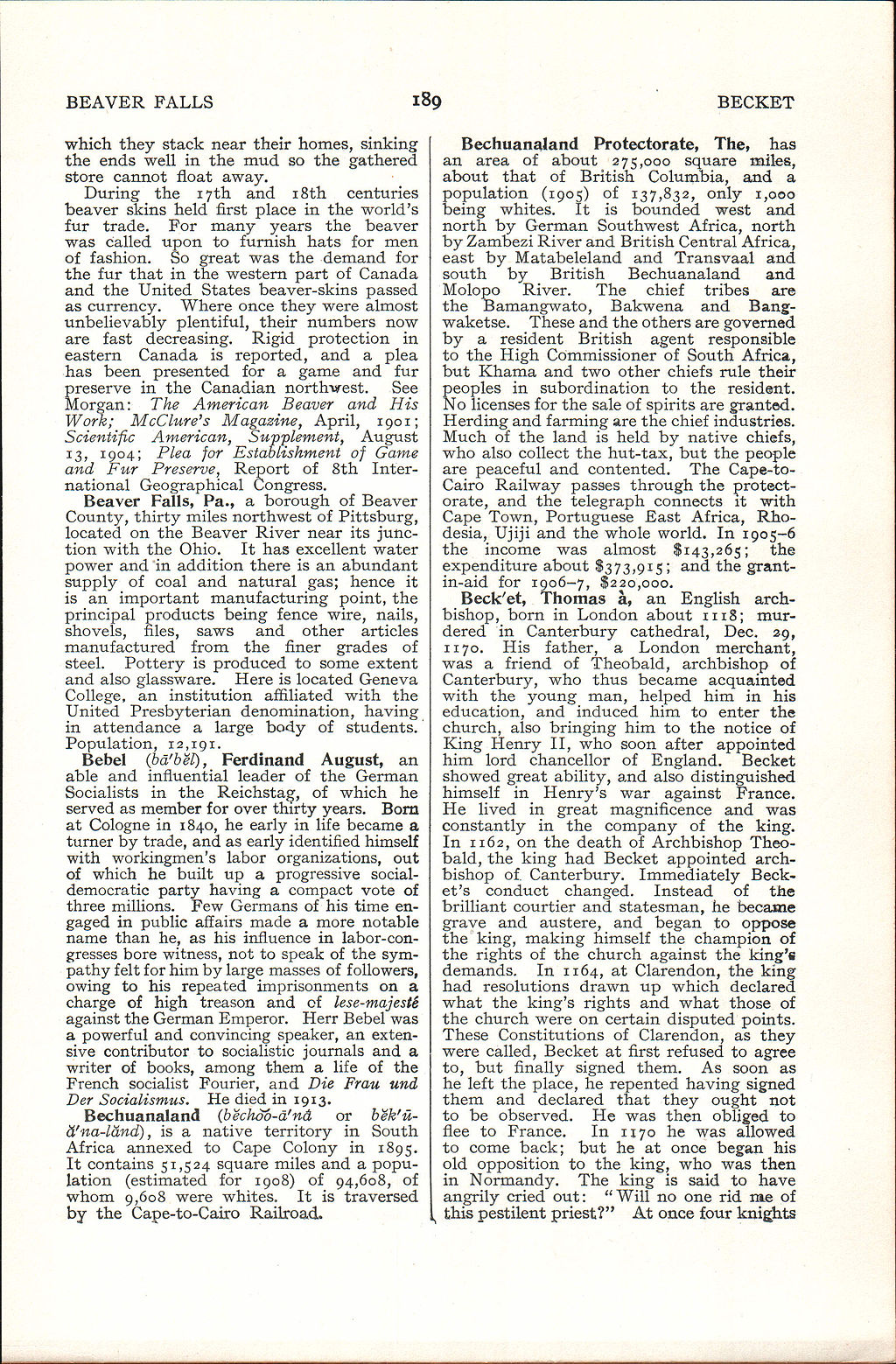which they stack near their homes, sinking the ends well in the mud so the gathered store cannot float away.
During the 17th and 18th centuries beaver skins held first place in the world's fur trade. For many years the beaver was called upon to furnish hats for men of fashion. So great was the demand for the fur that in the western part of Canada and the United States beaver-skins passed as currency. Where once they were almost unbelievably plentiful, their numbers now are fast decreasing. Rigid protection in eastern Canada is reported, and a plea has been presented for a game and fur preserve in the Canadian northwest. See Morgan: The American Beaver and His Work; McClure's Magazine, April, 1901; Scientific American Supplement, August 13, 1904; Plea for Establishment of Game and Fur Preserve, Report of 8th International Geographical Congress.
Beaver Falls, Pa., a borough of Beaver County, thirty miles northwest of Pittsburg, located on the Beaver River near its junction with the Ohio. It has excellent water power and in addition there is an abundant supply of coal and natural gas; hence it is an important manufacturing point, the principal products being fence wire, nails, shovels, files, saws and other articles manufactured from the finer grades of steel. Pottery is produced to some extent and also glassware. Here is located Geneva College, an institution affiliated with the United Presbyterian denomination, having in attendance a large body of students. Population, 12,191.
Bebel (bā'bĕl), Ferdinand August, an able and influential leader of the German Socialists in the Reichstag, of which he served as member for over thirty years. Born at Cologne in 1840, he early in life became a turner by trade, and as early identified himself with workingmen's labor organizations, out of which he built up a progressive social-democratic party having a compact vote of three millions. Few Germans of his time engaged in public affairs made a more notable name than he, as his influence in labor-congresses bore witness, not to speak of the sympathy felt for him by large masses of followers, owing to his repeated imprisonments on a charge of high treason and of lese-majesté against the German Emperor. Herr Bebel was a powerful and convincing speaker, an extensive contributor to socialistic journals and a writer of books, among them a life of the French socialist Fourier, and Die Frau und Der Socialismus. He died in 1913.
Bechuanaland (bĕchŏŏ-ä'nā́ or bĕk'ū-ă'na-lănd), is a native territory in South Africa annexed to Cape Colony in 1895. It contains 51,524 square miles and a population (estimated for 1908) of 94,608, of whom 9,608 were whites. It is traversed by the Cape-to-Cairo Railroad.
Bechuanaland Protectorate, The, has an area of about 275,000 square miles, about that of British Columbia, and a population (1905) of 137,832, only 1,000 being whites. It is bounded west and north by German Southwest Africa, north by Zambezi River and British Central Africa, east by Matabeleland and Transvaal and south by British Bechuanaland and Molopo River. The chief tribes are the Bamangwato, Bakwena and Bangwaketse. These and the others are governed by a resident British agent responsible to the High Commissioner of South Africa, but Khama and two other chiefs rule their peoples in subordination to the resident. No licenses for the sale of spirits are granted. Herding and farming are the chief industries. Much of the land is held by native chiefs, who also collect the hut-tax, but the people are peaceful and contented. The Cape-to-Cairo Railway passes through the protectorate, and the telegraph connects it with Cape Town, Portuguese East Africa, Rhodesia, Ujiji and the whole world. In 1905–6 the income was almost $143,265; the expenditure about $373,915; and the grant-in-aid for 1906–7, $220,000.
Beck′et, Thomas à, an English archbishop, born in London about 1118; murdered in Canterbury cathedral, Dec. 29, 1170. His father, a London merchant, was a friend of Theobald, archbishop of Canterbury, who thus became acquainted with the young man, helped him in his education, and induced him to enter the church, also bringing him to the notice of King Henry II, who soon after appointed him lord chancellor of England. Becket showed great ability, and also distinguished himself in Henry's war against France. He lived in great magnificence and was constantly in the company of the king. In 1162, on the death of Archbishop Theobald, the king had Becket appointed archbishop of. Canterbury. Immediately Becket's conduct changed. Instead of the brilliant courtier and statesman, he became grave and austere, and began to oppose the king, making himself the champion of the rights of the church against the king's demands. In 1164, at Clarendon, the king had resolutions drawn up which declared what the king's rights and what those of the church were on certain disputed points. These Constitutions of Clarendon, as they were called, Becket at first refused to agree to, but finally signed them. As soon as he left the place, he repented having signed them and declared that they ought not to be observed. He was then obliged to flee to France. In 1170 he was allowed to come back; but he at once began his old opposition to the king, who was then in Normandy. The king is said to have angrily cried out: “Will no one rid me of this pestilent priest?” At once four knights
